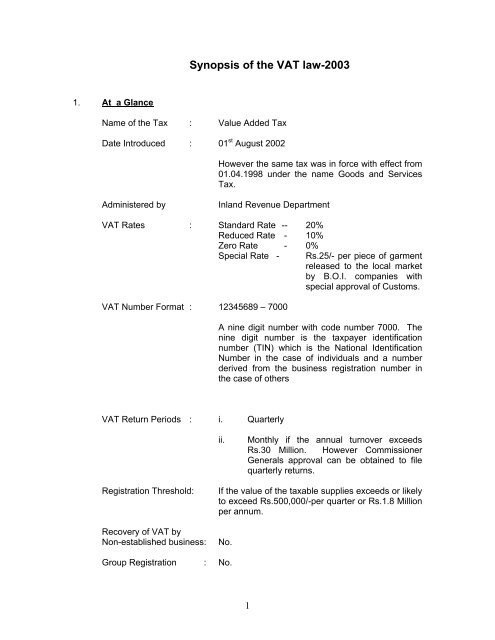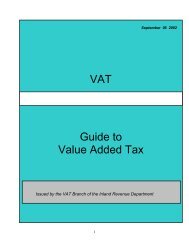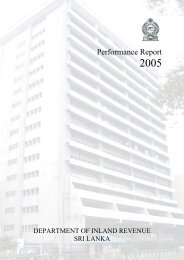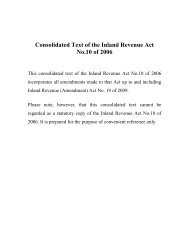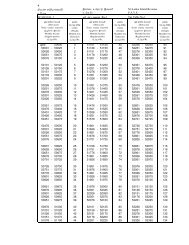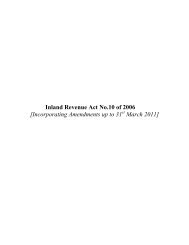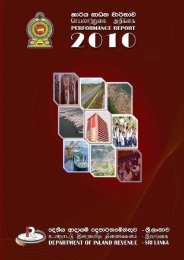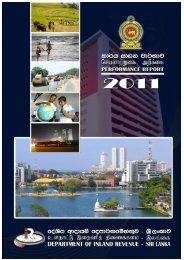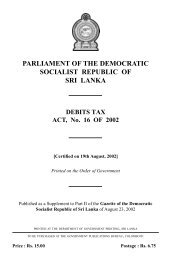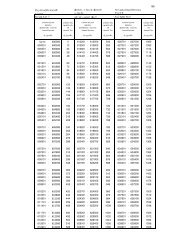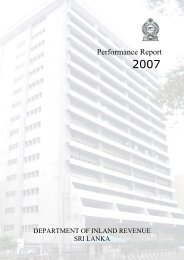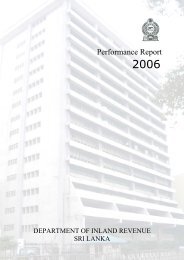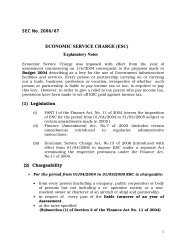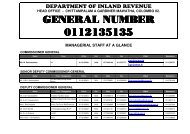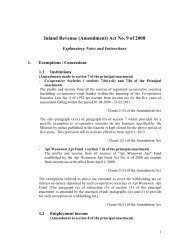Synopsis of the VAT law-2003 - sri lanka inland revenue department ...
Synopsis of the VAT law-2003 - sri lanka inland revenue department ...
Synopsis of the VAT law-2003 - sri lanka inland revenue department ...
You also want an ePaper? Increase the reach of your titles
YUMPU automatically turns print PDFs into web optimized ePapers that Google loves.
<strong>Synopsis</strong> <strong>of</strong> <strong>the</strong> <strong>VAT</strong> <strong>law</strong>-<strong>2003</strong><br />
1. At a Glance<br />
Name <strong>of</strong> <strong>the</strong> Tax : Value Added Tax<br />
Date Introduced : 01 st August 2002<br />
However <strong>the</strong> same tax was in force with effect from<br />
01.04.1998 under <strong>the</strong> name Goods and Services<br />
Tax.<br />
Administered by<br />
Inland Revenue Department<br />
<strong>VAT</strong> Rates : Standard Rate -- 20%<br />
Reduced Rate - 10%<br />
Zero Rate - 0%<br />
Special Rate - Rs.25/- per piece <strong>of</strong> garment<br />
released to <strong>the</strong> local market<br />
by B.O.I. companies with<br />
special approval <strong>of</strong> Customs.<br />
<strong>VAT</strong> Number Format : 12345689 – 7000<br />
A nine digit number with code number 7000. The<br />
nine digit number is <strong>the</strong> taxpayer identification<br />
number (TIN) which is <strong>the</strong> National Identification<br />
Number in <strong>the</strong> case <strong>of</strong> individuals and a number<br />
derived from <strong>the</strong> business registration number in<br />
<strong>the</strong> case <strong>of</strong> o<strong>the</strong>rs<br />
<strong>VAT</strong> Return Periods : i. Quarterly<br />
ii.<br />
Monthly if <strong>the</strong> annual turnover exceeds<br />
Rs.30 Million. However Commissioner<br />
Generals approval can be obtained to file<br />
quarterly returns.<br />
Registration Threshold:<br />
Recovery <strong>of</strong> <strong>VAT</strong> by<br />
Non-established business:<br />
If <strong>the</strong> value <strong>of</strong> <strong>the</strong> taxable supplies exceeds or likely<br />
to exceed Rs.500,000/-per quarter or Rs.1.8 Million<br />
per annum.<br />
No.<br />
Group Registration : No.<br />
1
Reverse Charge Mechanism: No<br />
2. Scope <strong>of</strong> <strong>the</strong> Tax<br />
i. Transactions -<br />
<strong>VAT</strong> applies to <strong>the</strong> following transactions.<br />
(a)<br />
(b)<br />
Supply <strong>of</strong> Goods & Services in Sri Lanka by a Registered Person<br />
Importation <strong>of</strong> Goods into Sri Lanka by any person.<br />
(a)<br />
On <strong>the</strong> supply <strong>of</strong> Goods and Services in Sri Lanka by a Registered<br />
person <strong>VAT</strong> is charged<br />
• at <strong>the</strong> “time <strong>of</strong> supply”<br />
• on every “taxable supply”<br />
• made in a “taxable period”<br />
• in <strong>the</strong> course <strong>of</strong> carrying on or carrying out a taxable<br />
activity in Sri Lanka<br />
• by that Registered person.<br />
In <strong>the</strong> case <strong>of</strong> supply <strong>of</strong> goods <strong>the</strong> goods must be in Sri Lanka<br />
at <strong>the</strong> time <strong>of</strong> supply.<br />
In <strong>the</strong> case <strong>of</strong> supply <strong>of</strong> services <strong>the</strong> services must be<br />
performed in Sri Lanka by <strong>the</strong> supplier or his agent.<br />
(b)<br />
On <strong>the</strong> importation <strong>of</strong> goods into Sri Lanka by any person <strong>VAT</strong> is charged.<br />
• at <strong>the</strong> time <strong>of</strong> supply<br />
• by <strong>the</strong> Department <strong>of</strong> Customs.<br />
ii.<br />
Exclusions from <strong>the</strong> Scope<br />
Following supplies (transactions) are excluded from <strong>the</strong> Scope <strong>of</strong> <strong>VAT</strong>.<br />
(a)<br />
(b)<br />
Supplies made in <strong>the</strong> course <strong>of</strong> wholesale and retail supply <strong>of</strong><br />
goods and commodities<br />
and<br />
Specified imports.<br />
(a)<br />
For <strong>the</strong> purpose <strong>of</strong> this exclusion wholesale and retails supply <strong>of</strong> goods<br />
and commodities does not include<br />
2
• wholesale and retail supply by a manufacturer <strong>of</strong> such<br />
goods.<br />
• Wholesale and retail supply by an importer <strong>of</strong> such goods.<br />
• Whole sale and retail supply by a supplier who is unable to<br />
satisfy <strong>the</strong> Commissioner General as to <strong>the</strong> source from<br />
which such goods were acquired.<br />
• Supply <strong>of</strong> goods on tender<br />
• Sale <strong>of</strong> goods by auction.<br />
Thus <strong>the</strong> above five categories <strong>of</strong> transactions are within <strong>the</strong><br />
scope <strong>of</strong> <strong>VAT</strong>.<br />
(b)<br />
Following specified imports are excluded from <strong>the</strong> scope.<br />
• any imported goods which are entered into a Customs<br />
Bonded Area<br />
• In addition importation <strong>of</strong> fabric by certain garment<br />
manufacturers cum exporters and importation <strong>of</strong> yarn grey<br />
cloth, chemicals and dyes for <strong>the</strong> purpose <strong>of</strong> manufacturer<br />
<strong>of</strong> fabric to be used by <strong>the</strong> above mentioned garment<br />
manufacturers cum exporters are excluded from <strong>the</strong> scope<br />
<strong>of</strong> <strong>VAT</strong>.<br />
iii.<br />
Persons within <strong>the</strong> Scope<br />
From <strong>the</strong> point <strong>of</strong> view <strong>of</strong> persons <strong>the</strong>re are two categories <strong>of</strong> persons<br />
who are within <strong>the</strong> scope <strong>of</strong> <strong>VAT</strong>.<br />
They are<br />
(a)<br />
(b)<br />
The persons who are liable to pay <strong>VAT</strong> to government or <strong>the</strong> <strong>VAT</strong><br />
tax payers, and<br />
The persons who are subject to <strong>VAT</strong> as consumers on <strong>the</strong> goods<br />
and services consumed by <strong>the</strong>m or on goods imported by <strong>the</strong>m.<br />
(a)<br />
Who is liable<br />
The “<strong>VAT</strong> taxpayer” who is required to file returns with <strong>the</strong> Inland<br />
Revenue and pay <strong>VAT</strong> to <strong>the</strong> government is known as <strong>the</strong> “Registered<br />
person” in <strong>the</strong> <strong>VAT</strong> Act. This refers to any “individual” or “body <strong>of</strong><br />
persons” who makes “taxable supplies” <strong>of</strong> goods and services in <strong>the</strong><br />
course <strong>of</strong> carrying on carrying out a ‘taxable activity” in Sri Lanka and<br />
3
who is registered for <strong>VAT</strong>. No individual or “body <strong>of</strong> persons” is<br />
exempted from <strong>the</strong> requirement to register for <strong>VAT</strong> if <strong>the</strong> (taxable)<br />
supplies made by such person exceeds <strong>the</strong> registrable threshold. Every<br />
registered person is liable to charge and collect <strong>VAT</strong> on <strong>the</strong> (taxable)<br />
supplies made by such person and to account for such collections to<br />
Inland Revenue.<br />
(Body <strong>of</strong> persons means any body corporate or uniacorporate,<br />
provincial council, local authority, any fraternity, fellowship, association or<br />
society <strong>of</strong> persons, whe<strong>the</strong>r corporate or uniacorporate, any partnership<br />
and includes any government <strong>department</strong> or any undertaking <strong>of</strong> <strong>the</strong><br />
government or any co-ownership <strong>of</strong> immovable property)<br />
(b)<br />
Persons subject to <strong>VAT</strong><br />
The second category is <strong>the</strong> persons who do not pay <strong>VAT</strong> direct to <strong>the</strong><br />
government and or do not file returns but are subject to <strong>VAT</strong> on <strong>the</strong> goods<br />
and services purchased by <strong>the</strong>m from registered persons and on <strong>the</strong><br />
goods imported by <strong>the</strong>m. That means <strong>the</strong>y pay <strong>VAT</strong> along with <strong>the</strong> price<br />
paid for goods and services etc. In this category <strong>the</strong>re are some<br />
exempt persons. They are Diplomatic Missions and Privileged<br />
Individuals as defined in <strong>the</strong> Diplomatic Privillages Act. They are<br />
exempted from <strong>VAT</strong> in <strong>the</strong> sense that <strong>the</strong>y are required to pay only <strong>the</strong><br />
“<strong>VAT</strong> –exclusive price” in respect certain goods and services identified<br />
by <strong>the</strong> Commissioner General <strong>of</strong> Inland Revenue and on <strong>the</strong> importation<br />
<strong>of</strong> identified goods. Subject to this exemption all individuals and “bodies<br />
<strong>of</strong> persons’ including government Departments & Ministries, religious and<br />
charitable institutions, non-pr<strong>of</strong>it making bodies are within <strong>the</strong> scope <strong>of</strong><br />
<strong>VAT</strong> in <strong>the</strong> sense that <strong>the</strong>y will be required to pay “<strong>VAT</strong> inclusive prices”<br />
in respect <strong>of</strong> goods and services purchased by <strong>the</strong>m from registered<br />
persons and on <strong>the</strong> importation <strong>of</strong> goods.<br />
3. Who is liable and Registration<br />
As stated above <strong>the</strong> <strong>VAT</strong> tax payer or <strong>the</strong> person who is liable to pay <strong>VAT</strong> to<br />
<strong>the</strong> government is known as <strong>the</strong> registered person. Every registered person<br />
is liable to charge and collect <strong>VAT</strong> on <strong>the</strong> taxable supplies made by him and to<br />
file returns with <strong>the</strong> Inland Revenue in order to account for such collections.<br />
There are four types <strong>of</strong> registrations. Broadly <strong>the</strong>re are two types <strong>of</strong> registrations<br />
namely (i) those who are liable to register and (ii) <strong>the</strong>se who are entitle to<br />
register.<br />
(i)<br />
Who is liable to register<br />
4
(a)<br />
Compulsory Registration<br />
Every person (ie an individual or a body <strong>of</strong> persons) who carries on a<br />
taxable activity should register for <strong>VAT</strong> if <strong>the</strong> value <strong>of</strong> his taxable supplies<br />
exceeds or likely to exceed Rs.500,000/- per quarter or Rs. 1.8 Million per<br />
annum. No person is exempted from registration requirements if he<br />
satisfy <strong>the</strong> above conditions Thus Govt. Departments, Ministries,<br />
Religious, Social Services and charitable institutions, Non-pr<strong>of</strong>it making<br />
bodies are all liable to register.<br />
In computing <strong>the</strong> value <strong>of</strong> supplies to determine <strong>the</strong> above threshold <strong>the</strong><br />
following should be excluded.<br />
• Value <strong>of</strong> any exempt supplies<br />
• Value <strong>of</strong> any excluded supplies consisting <strong>of</strong> retail and<br />
wholesale sales.<br />
• <strong>VAT</strong> chargeable on <strong>the</strong> supply.<br />
(Although certain bodies <strong>of</strong> persons like partnerships are not juristic<br />
persons <strong>the</strong>y are required to be registered under <strong>the</strong> <strong>VAT</strong> Act. All<br />
partners <strong>of</strong> a partnership and principle <strong>of</strong>ficers <strong>of</strong> o<strong>the</strong>r organization are<br />
singly and severally liable for any <strong>of</strong>fences under <strong>the</strong> Act).<br />
(b)<br />
Forced Registration<br />
If <strong>the</strong> Commissioner General having regard to <strong>the</strong> nature <strong>of</strong> <strong>the</strong> activity is<br />
<strong>of</strong> <strong>the</strong> opinion that a person is required to be registered but has not made<br />
an application to that effect, he still register such person.<br />
(ii)<br />
(a)<br />
Entitlement to register<br />
Voluntary Registration – After <strong>the</strong> commencement <strong>of</strong> commercial<br />
operations<br />
• If a person has commenced making taxable supplies<br />
irrespective <strong>of</strong> whe<strong>the</strong>r <strong>the</strong> value <strong>of</strong> taxable supplies has<br />
reached <strong>the</strong> threshold or not any person who wishes to<br />
register for <strong>VAT</strong> can apply for voluntary registration. Such<br />
application may be refused by <strong>the</strong> Commissioner General<br />
if it is considered an impediment to <strong>the</strong> protection <strong>of</strong><br />
<strong>revenue</strong>.<br />
• Retail and wholesale suppliers who are o<strong>the</strong>rwise excluded<br />
can also apply for voluntary registration.<br />
5
(b)<br />
Voluntary Registration – Before <strong>the</strong> commencement <strong>of</strong> commercial<br />
operations - Registration <strong>of</strong> Newly Commenced Businesses<br />
Even before <strong>the</strong> commencement <strong>of</strong> making taxable supplies (ie. Even<br />
before <strong>the</strong> commencement <strong>of</strong> commercial operations) any newly<br />
commenced business or project is entitled to register for <strong>VAT</strong>, subject to<br />
any conditions specified by <strong>the</strong> Commissioner General. In such cases<br />
output tax = 0 and <strong>the</strong> person is entitled to refund <strong>of</strong> input tax incurred on<br />
project related inputs.<br />
(iii)<br />
Exemption from Registration<br />
No individual or body <strong>of</strong> persons is exempted from <strong>the</strong> requirement to<br />
register if such person satisfies <strong>the</strong> conditions required to register.<br />
(iv)<br />
Consequences <strong>of</strong> Registration<br />
Once registered such person must charge & collect <strong>VAT</strong> on all taxable<br />
supplies made by him even if his turnover falls below <strong>the</strong> threshold until<br />
he is <strong>of</strong>ficially de-registered. De-registration will not be done within <strong>the</strong><br />
first 12 months <strong>of</strong> registration. Thus a registered person must charge &<br />
collect <strong>VAT</strong> at least for one year.<br />
(v)<br />
Cancellation <strong>of</strong> Registration (De-registration)<br />
Application can be made at any time after <strong>the</strong> laps <strong>of</strong> 12 months if <strong>the</strong><br />
turnover has fallen below <strong>the</strong> threshold. Notwithstanding <strong>the</strong> deregistration<br />
such person is liable for any act done or omitted to be done<br />
while he was registered. Any goods and assets at <strong>the</strong> time <strong>of</strong><br />
cancellation <strong>of</strong> registration shall be deemed to be supplied in <strong>the</strong> course<br />
<strong>of</strong> carrying on that taxable activity. Thus before de-registration a<br />
person will be asked to pay <strong>VAT</strong> on existing stocks and assets unless <strong>the</strong><br />
taxable activity is transferred as a whole to ano<strong>the</strong>r registered person who<br />
undertakes to carry on <strong>the</strong> taxable activity.<br />
(vi)<br />
Group Registration<br />
There is no provision in Sri Lanka <strong>VAT</strong> <strong>law</strong> to allow closely related<br />
companies which are under common control or which are in one group to<br />
register as a group. Transactions between <strong>the</strong> companies are liable to<br />
<strong>VAT</strong>. However a ruling has been given by <strong>the</strong> Commissioner General <strong>of</strong><br />
Inland Revenue permitting central invoicing in <strong>the</strong> case <strong>of</strong> companies in<br />
one group. That means invoices from <strong>the</strong> suppliers will be allowed to be<br />
received by one central company and <strong>the</strong> expenditure will be allowed to<br />
be debited to o<strong>the</strong>r companies on some valid basis. Entire <strong>VAT</strong> (input<br />
tax) can be claimed/recovered by <strong>the</strong> central company who receive <strong>the</strong><br />
invoices. This procedure is allowed only if all <strong>the</strong> companies are making<br />
only taxable supplies but not exempt supplies.<br />
6
(vii)<br />
Importers Registration<br />
Apart from such registration every importer <strong>of</strong> goods, if he is not a <strong>VAT</strong><br />
registered person he is required obtain an Importers Identifications<br />
Number (IIN) from <strong>the</strong> Commissioner General <strong>of</strong> Inland Revenue in order<br />
to clear goods from <strong>the</strong> Customs because irrespective <strong>of</strong> <strong>the</strong> status <strong>of</strong> <strong>the</strong><br />
importer (i.e whe<strong>the</strong>r he is a <strong>VAT</strong> registered person or not) he is required<br />
to pay <strong>VAT</strong> on imports to <strong>the</strong> Customs. This I.I.N. is not a <strong>VAT</strong><br />
registration because a person cannot charge and collect <strong>VAT</strong> with such a<br />
registration.<br />
(viii)<br />
Registration <strong>of</strong> Partnerships and o<strong>the</strong>r non-legal entities<br />
As all “bodies <strong>of</strong> persons” are liable to register for <strong>VAT</strong> if <strong>the</strong>y are<br />
carrying on or carrying out taxable activities and if value <strong>of</strong> <strong>the</strong> taxable<br />
supplies made by <strong>the</strong>m exceeds <strong>the</strong> threshold all non legal entities such<br />
as partnerships, clubs, associations etc. are liable to register for <strong>VAT</strong>.<br />
The individual partners <strong>of</strong> a partnership and <strong>the</strong> principle <strong>of</strong>ficer <strong>of</strong> o<strong>the</strong>r<br />
entities are personally liable for any <strong>of</strong>fences under <strong>the</strong> Act including<br />
failure to register.<br />
(ix)<br />
Non-Established Businesses<br />
Businesses that have no fixed establishment in <strong>the</strong> territory <strong>of</strong> Sri Lanka<br />
are not obliged to register for <strong>VAT</strong> in order to do <strong>the</strong> business <strong>of</strong> supply <strong>of</strong><br />
goods and services to persons in Sri Lanka. However if such company<br />
carries on a taxable activity and supply goods or services in Sri Lanka<br />
through a representative in Sri Lanka who is acting on behalf <strong>of</strong> <strong>the</strong><br />
foreign principle <strong>the</strong>n such representative is liable to <strong>VAT</strong> in <strong>the</strong> like<br />
manner and to <strong>the</strong> like amount as <strong>the</strong> foreign principle (Section 55 <strong>of</strong> <strong>the</strong><br />
Act). The representative should register for <strong>VAT</strong> on behalf <strong>of</strong> <strong>the</strong> foreign<br />
principle if he satisfies <strong>the</strong> registration conditions.<br />
(x)<br />
Late Registration Penalty<br />
4. Taxable Activity<br />
A person is required to make an application for registration for <strong>VAT</strong> within<br />
15 days <strong>of</strong> becoming liable to register. Failure to register will be subject<br />
to a fine <strong>of</strong> Rs. 25,000/- and or a term <strong>of</strong> imprisonment not exceeding 6<br />
months after a summary trial by a magistrate.<br />
A person (ie an individual or a body <strong>of</strong> persons) must carry on a taxable activity<br />
in Sri Lanka for such person to be registered for <strong>VAT</strong> – Taxable Activity means<br />
(a) * any activity carried on as a trade, business, pr<strong>of</strong>ession or<br />
vocation (o<strong>the</strong>r than employment)<br />
* every adventure and concern in <strong>the</strong> nature <strong>of</strong> trade.<br />
7
(b)<br />
In relation to a club, association or organization, taxable activity means<br />
* provision <strong>of</strong> facilities for a consideration (to members and o<strong>the</strong>rs)<br />
* collection <strong>of</strong> subscriptions, membership fees and similar charges<br />
(c)<br />
Anything done in connection with <strong>the</strong> commencement or cessation <strong>of</strong><br />
activities referred to in (a) & (b) above.<br />
(d) * hiring or leasing <strong>of</strong> any movable property.<br />
* renting or leasing <strong>of</strong> any immovable property<br />
* administration <strong>of</strong> any property.<br />
For registration for <strong>VAT</strong> one <strong>of</strong> <strong>the</strong> above mentioned activities must exist.<br />
5. Taxable supply<br />
As stated earlier <strong>VAT</strong> is charged on “every taxable supply” made in <strong>the</strong> course<br />
<strong>of</strong> carrying on or carrying out a taxable activity by a registered person. Thus<br />
once a person is registered, even if his turnover falls below <strong>the</strong> threshold, <strong>VAT</strong> is<br />
charged on “every taxable supply” made by him. Taxable supply means any<br />
supply <strong>of</strong> goods or services,<br />
* made in Sri Lanka or<br />
* deemed to be made in Sri Lanka<br />
* which is chargeable with <strong>VAT</strong> under <strong>the</strong> Act, and<br />
* includes a zero rated supply<br />
* but not an exempt supply<br />
The “taxable supply” refers to supplies <strong>of</strong> goods and services and imports that<br />
are liable to a rate <strong>of</strong> <strong>VAT</strong> including zero rate(0%).<br />
Whe<strong>the</strong>r a certain supply <strong>of</strong> goods or services is a taxable supplies or not canbe<br />
found out by reference to schedule I <strong>of</strong> <strong>the</strong> Act which enumerates supplies <strong>of</strong><br />
goods and services which are exempted. If a certain supply is not an exempt<br />
supply and or not an excluded supply as mentioned above in para 2(ii) above<br />
<strong>the</strong>n it is a taxable supply.<br />
The exempt supplies are within <strong>the</strong> scope <strong>of</strong> <strong>VAT</strong> but <strong>the</strong>y do not give rise to a<br />
right <strong>of</strong> input tax deduction.<br />
Goods<br />
Services<br />
* Supply or import <strong>of</strong> bread, rice, * Supply <strong>of</strong> public passenger<br />
rice flour, wheat flour and eggs.<br />
Transport services<br />
* Supply or import liquid milk * Supply <strong>of</strong> health care services<br />
8
(o<strong>the</strong>r than supply by some BOI<br />
companies<br />
* Supply or import <strong>of</strong> books * Supply, lease or rent <strong>of</strong><br />
residential accommodation<br />
(o<strong>the</strong>r than by some BOI<br />
companies)<br />
* Supply or import <strong>of</strong> diamonds, * supply <strong>of</strong> leasing facility for<br />
precious metals and gold coins<br />
* Supply or import <strong>of</strong> unprocessed<br />
agricultural, horticultural; animal<br />
husbandry fishing and forestry products<br />
motor coaches used in public<br />
passenger transport services<br />
if <strong>the</strong> seating capacity exceeds<br />
28 seats.<br />
<strong>VAT</strong> Act also recognizes deemed supplies. Deemed taxable supplies occur<br />
when <strong>the</strong> registration <strong>of</strong> a registered person is cancelled. The goods or services<br />
(including fixed assets) remaining at <strong>the</strong> time <strong>of</strong> cancellation <strong>of</strong> registration are<br />
deemed to have been supplied by that person. He is required to pay <strong>VAT</strong> on <strong>the</strong><br />
market value <strong>of</strong> such stocks & assets. Any goods and services taken for <strong>the</strong><br />
personal use/consumption <strong>of</strong> <strong>the</strong> registered person are also treated as deemed<br />
supplies.<br />
6. Taxable period<br />
Registered persons are required to file <strong>the</strong>ir returns and account for <strong>VAT</strong> charged<br />
and collected in respect <strong>of</strong> each taxable supply for each taxable period. There<br />
are two taxable periods viz.<br />
* Month and<br />
* Quarter<br />
For details please refer to para No. 12.<br />
7. Time <strong>of</strong> Supply and Accounting for <strong>VAT</strong><br />
(a)<br />
Time <strong>of</strong> supply or <strong>the</strong> “Tax Point”<br />
The time when <strong>VAT</strong> becomes due is called <strong>the</strong> “time <strong>of</strong> supply” or <strong>the</strong><br />
“tax point”. The “time <strong>of</strong> supply” depends on <strong>the</strong> particular type <strong>of</strong><br />
supply. Following are few examples <strong>of</strong> time <strong>of</strong> supply.<br />
i. Supply <strong>of</strong> goods<br />
Time <strong>of</strong> supply is <strong>the</strong> earliest <strong>of</strong><br />
Date <strong>of</strong> invoice<br />
Due date <strong>of</strong> payment<br />
Date <strong>of</strong> receipt <strong>of</strong> payment/advance<br />
9
Date <strong>of</strong> delivery<br />
However if <strong>the</strong> invoice is issued within 10 days <strong>of</strong> delivery <strong>the</strong>n <strong>the</strong> time<br />
<strong>of</strong> supply is <strong>the</strong> date <strong>of</strong> invoice.<br />
ii.<br />
Supply <strong>of</strong> services<br />
Time <strong>of</strong> supply is <strong>the</strong> earliest <strong>of</strong><br />
When <strong>the</strong> invoice is issued<br />
When <strong>the</strong> payment is due<br />
When <strong>the</strong> payment is received<br />
When <strong>the</strong> service is performed.<br />
However, if <strong>the</strong> invoice is issued within 10 days <strong>of</strong> performing service<br />
<strong>the</strong>n <strong>the</strong> time <strong>of</strong> supply is <strong>the</strong> date <strong>of</strong> invoice.<br />
iii.<br />
Importation <strong>of</strong> goods<br />
* If <strong>the</strong>re is no duty suspension, <strong>the</strong> time at which goods are cleared<br />
by <strong>the</strong> Customs and leave <strong>the</strong> Customs or Customs Bonded<br />
warehouse as <strong>the</strong> case may be<br />
* If <strong>the</strong>re is a duty suspension <strong>the</strong> time when and if <strong>the</strong> suspended<br />
duty becomes payable.<br />
iv.<br />
Supply under hire-purchase agreements<br />
Time at which <strong>the</strong> agreement is entered into.<br />
v. Supply under agreements for periodic payments (o<strong>the</strong>r than hirepurchase<br />
agreements)<br />
When <strong>the</strong> payment is due or<br />
When <strong>the</strong> payment is received<br />
Which every is earlier.<br />
(b)<br />
Accounting for <strong>VAT</strong><br />
Taxable Persons (i.e Registered Persons) are required to file returns and<br />
account for <strong>VAT</strong> on invoice basis. Approval can be obtained in certain<br />
situations to file returns on cash basis which is also called payment basis.<br />
Under <strong>the</strong> invoice basis <strong>of</strong> accounting a registered person must account<br />
for <strong>VAT</strong> when <strong>the</strong> tax point occurs as given above. For example in <strong>the</strong><br />
case <strong>of</strong> supply <strong>of</strong> goods <strong>the</strong> output tax must be declared when <strong>the</strong><br />
invoice is issued or when <strong>the</strong> payment is received or on <strong>the</strong> due date <strong>of</strong><br />
payment or on <strong>the</strong> date <strong>of</strong> delivery which ever <strong>the</strong> date that comes first.<br />
Input tax is recoverable (claimable) on <strong>the</strong> basis <strong>of</strong> invoices received.<br />
Under <strong>the</strong> (cash) payment basis <strong>of</strong> accounting (if approved by <strong>the</strong><br />
Commissioner General) a registered person must account for <strong>VAT</strong>, that<br />
10
8. Value <strong>of</strong> supply<br />
means output tax must be declared when cash is received. Input tax<br />
is claimable only on <strong>the</strong> basis <strong>of</strong> invoices paid. (This method has a<br />
disadvantage in Sri Lanka because whichever <strong>the</strong> basis <strong>of</strong> accounting <strong>the</strong><br />
Registered Person must claim input tax within six months <strong>of</strong> <strong>the</strong> date <strong>of</strong><br />
receipt <strong>of</strong> invoice.).<br />
<strong>VAT</strong> is calculated on <strong>the</strong> value <strong>of</strong> each supply. Value <strong>of</strong> supply too depends on<br />
<strong>the</strong> type <strong>of</strong> supply. How to ascertain <strong>the</strong> value <strong>of</strong> supply in certain situations is<br />
given below.<br />
Type <strong>of</strong> Supply<br />
Value<br />
i.. Supply <strong>of</strong> goods<br />
When <strong>the</strong> recepient is a registered person<br />
and services * If <strong>the</strong> consideration is in money<br />
- Total consideration less <strong>VAT</strong> or<br />
- Open market value<br />
which ever is higher<br />
* If not in money or partly in money<br />
- Open market value<br />
When <strong>the</strong> recipient is not a registered Person<br />
- tax inclusive consideration or<br />
- open market value<br />
which ever is higher<br />
ii. Import <strong>of</strong> goods CIF + Customs Duty + any surcharge + Cess +<br />
any Excise Duty payable to Customs<br />
iii. Benefits from * Open Market Value or<br />
employment * Cost <strong>of</strong> a similar benefit to any o<strong>the</strong>r<br />
employee as determined by <strong>the</strong><br />
Assessor if <strong>the</strong> open market value<br />
cannot be ascertained.<br />
iv. Lottery or Wagering Total amount received less value <strong>of</strong> <strong>the</strong> prize or<br />
contract or any business<br />
winnings awarded.<br />
Of like nature<br />
v. Supply <strong>of</strong> goods under Cash price determined under Consumer Credit<br />
Hire purchase agreement Act or Market value which ever is higher (subject<br />
to adjustments for non claimable input by <strong>the</strong><br />
seller <strong>of</strong> goods when <strong>the</strong> seller is a person<br />
different from <strong>the</strong> Hirer.)<br />
If <strong>the</strong> hired goods are second hand and more<br />
than one year old.<br />
- Value specified in <strong>the</strong> agreement less<br />
hire purchase charges<br />
vi. Supply <strong>of</strong> land and Consideration – (Value <strong>of</strong> Land at <strong>the</strong> time <strong>of</strong> supply +<br />
improvement improvements upto 31.03.1998)<br />
11
(Consideration shall not be less than <strong>the</strong> open<br />
market value) Thus, it is = Open Market<br />
Value <strong>of</strong> improvements after 31.03.1998<br />
vii. Supply under non- Total amount paid/payable under <strong>the</strong> agreement<br />
reviewable Agreement, o<strong>the</strong>r (It is considered as a tax inclusive<br />
consideration)<br />
than Hire Purchase Agreement,<br />
Entered prior to 01.04.1998.<br />
viii. Transfer <strong>of</strong> goods on<br />
Termination <strong>of</strong> Lease<br />
* If <strong>the</strong> consideration is less Treated as an installment under lease agreement.<br />
than 10% <strong>of</strong> <strong>the</strong> value <strong>of</strong><br />
<strong>the</strong> agreement<br />
* If <strong>the</strong> consideration is more Treated as a separate supply <strong>of</strong> goods and <strong>the</strong><br />
than 10% <strong>of</strong> <strong>the</strong> value <strong>of</strong> value is <strong>the</strong> amount paid to acquire <strong>the</strong> asset.<br />
lease Agreement<br />
ix. Supply is a combination <strong>of</strong><br />
taxable and non taxable<br />
supplies<br />
Open Market Value <strong>of</strong> <strong>the</strong> taxable portion<br />
x. Goods which are - Consideration received or<br />
manufactured using o<strong>the</strong>r - Open Market Value<br />
goods or services/supply <strong>of</strong><br />
which ever is higher<br />
services using o<strong>the</strong>r goods or<br />
services<br />
xi. Issue <strong>of</strong> ticket or deposit <strong>of</strong><br />
money for <strong>the</strong> supply <strong>of</strong> goods<br />
or services<br />
Value <strong>of</strong> <strong>the</strong> ticket or deposit less <strong>the</strong> <strong>VAT</strong>,<br />
not being any refundable amount<br />
9. <strong>VAT</strong> Rates<br />
In Sri Lanka four rates <strong>of</strong> <strong>VAT</strong> are currently applicable; <strong>the</strong> standard rate at<br />
20%, <strong>the</strong> reduced rate at 10%, <strong>the</strong> zero rate (0%) and <strong>the</strong> special rate <strong>of</strong><br />
Rs.25.00 per piece <strong>of</strong> garment released to <strong>the</strong> local market by companies<br />
registered under Section 17 <strong>of</strong> <strong>the</strong> Board <strong>of</strong> Investment Law to manufacture and<br />
export garments. This is payable by <strong>the</strong> buyer through a Customs Declaration as<br />
if it is an imports.<br />
The following table lists examples <strong>of</strong> 20% supplies, 10% supplies and 0%<br />
supplies. The list is not exhaustive.<br />
Supplies taxed Supplies taxed Supplies taxed<br />
12
at 0% at 10% at 20%<br />
*. Export <strong>of</strong> goods * Supply <strong>of</strong> electricity * Supply or import <strong>of</strong><br />
(Even exempt goods if <strong>the</strong>y<br />
Motor vehicles<br />
are exported is taxed at 0%) * Supply <strong>of</strong> services by<br />
construction<br />
* Supply or import <strong>of</strong><br />
* Services directly connected contractors. Building materials<br />
with movable and immovable<br />
property outside Sri Lanka. * Supply <strong>of</strong> services * Any o<strong>the</strong>r supply<br />
by Hotels, guest or import which is<br />
* International transportation houses, not in 0% list<br />
Restaurants<br />
and 10% schedule.<br />
* Repair <strong>of</strong> any foreign ship<br />
or air craft, refurbishment<br />
<strong>of</strong> marine cargo containers<br />
* Supply or import <strong>of</strong><br />
Magazines & Journals<br />
* Services provided in Sri Lanka * Supply or import <strong>of</strong> petrol,<br />
consumed outside Sri Lanka diesel, fuel, L.P. Gas<br />
to <strong>the</strong> extent that <strong>the</strong> payment<br />
for such services are received<br />
foreign currency through a bank.<br />
10. Recovery <strong>of</strong> <strong>VAT</strong> (input tax) by taxable persons<br />
i. How to re-cliam<br />
A taxable person (i.e a registered person) can recover or re-claim from<br />
<strong>the</strong> government <strong>the</strong> <strong>VAT</strong> paid (that means <strong>the</strong> input tax incurred) on <strong>the</strong><br />
goods and services used by it for business purposes. Input tax is<br />
generally recovered by being deducted from output tax payable to <strong>the</strong><br />
government on <strong>the</strong> goods and services supplied by such persons. (Thus<br />
what is payable to <strong>the</strong> government by a registered person is output<br />
tax charged less input tax incurred)<br />
Input tax includes <strong>VAT</strong> paid along with <strong>the</strong> price paid for goods and<br />
services used by it for <strong>the</strong> purpose <strong>of</strong> making <strong>the</strong> taxable supplies and<br />
<strong>VAT</strong> paid on import <strong>of</strong> goods for <strong>the</strong> same purpose. A valid tax-invoice or<br />
customs document should generally accompany a claim for input tax.<br />
(ii)<br />
Non-deductible input tax<br />
Input tax credit cannot be claimed on purchases <strong>of</strong> goods and services<br />
that are not attributable to <strong>the</strong> making <strong>of</strong> taxable supplies by <strong>the</strong><br />
registered person. (For example goods acquired for private use.) In<br />
addition input tax may not be cliamable in respect <strong>of</strong> certain items <strong>of</strong><br />
business expenditure. Following table sets out some items <strong>of</strong><br />
expenditure for which input tax is deductible and non – deductible.<br />
13
Expenses for which input Tax is<br />
not – deductible<br />
Expenses for which input tax is<br />
deductible<br />
* Private expenditure * Advertising<br />
* 50% <strong>of</strong> expenditure on purchase, * Conferences and Seminars<br />
hire, lease, maintenance and fuel<br />
* Business gifts (output tax must be<br />
for travelling vehicles<br />
accounted for)<br />
* Expenditure directly connected to * Private use <strong>of</strong> business assets<br />
exempt supplies<br />
(output tax must be accounted for)<br />
* Business telephones including<br />
mobile phones<br />
* All o<strong>the</strong>r expenses which are<br />
directly connected to output.<br />
(iii)<br />
Partially recoverable input tax(Partial Exemptions)<br />
Normally input tax directly related to taxable supplies is deductible in full,<br />
while input tax directly related to exempt supplies is not deductible. If <strong>the</strong><br />
registered person is making both exempt and taxable supplies and if <strong>the</strong><br />
input tax is related to both such supplies (eg: input tax on general business<br />
overheads) <strong>the</strong> deductible portion <strong>of</strong> input tax is calculated on a general<br />
pro-rata basis i.e <strong>the</strong> percentage <strong>of</strong> deductible<br />
Input tax = Value <strong>of</strong> taxable supplies x 100<br />
Value <strong>of</strong> Total supplies<br />
(iv)<br />
Input tax recovery on capital goods<br />
Capital goods are items <strong>of</strong> expenditure which are used in a taxable<br />
activity (business) over several years. But <strong>the</strong> input tax incurred on <strong>the</strong><br />
acquisition <strong>of</strong> a capital asset is deducted in <strong>the</strong> taxable period which it<br />
was acquired. If <strong>the</strong> input tax is deductible only – partially (on a pro-rata<br />
basis) for <strong>the</strong> reason that <strong>the</strong> asset is used for both taxable and exempt<br />
activities no adjustments are made over time on account <strong>of</strong> change in <strong>the</strong><br />
percentage if deductible input tax from one taxable period to ano<strong>the</strong>r.<br />
(v)<br />
Recovery <strong>of</strong> Input tax by newly commenced businesses<br />
As any newly commenced business or project is entitled to register for<br />
<strong>VAT</strong> prior to <strong>the</strong> commencement <strong>of</strong> making any taxable supplies input tax<br />
incurred on project related goods (o<strong>the</strong>r than non-deductible input tax) is<br />
recoverable by any new business although <strong>the</strong> output tax is zero.<br />
(vi)<br />
Input tax restriction<br />
With effect from 1 st July <strong>2003</strong> it is proposed to restrict <strong>the</strong> recoverable<br />
input tax to 10% even if input tax has been incurred at 20%. If <strong>the</strong> output<br />
relating to such supplies is taxed at 10%. That means in situations where<br />
14
<strong>the</strong> output tax is 10% <strong>the</strong> input tax claimable will also be restricted 10%.<br />
Thus <strong>the</strong> enterprise will have to capitalize <strong>the</strong> balance 10%.<br />
(vii)<br />
Refund Application (Excess Input tax)<br />
If <strong>the</strong> amount <strong>of</strong> ‘input tax recoverable’ in taxable period exceeds <strong>the</strong><br />
amount <strong>of</strong> “output tax payable” in that period <strong>the</strong> registered person has<br />
an input tax credit or input tax surplus. The registered person is entitled<br />
to a refund <strong>of</strong> this surplus(or excess input tax) except in <strong>the</strong> case <strong>of</strong><br />
persons engaged in import and re-sell <strong>of</strong> <strong>the</strong> goods imported. Such<br />
importers are required to carry forward <strong>the</strong> excess input tax indefinitely<br />
from one taxable period to <strong>the</strong> next and so on. In <strong>the</strong> case <strong>of</strong> o<strong>the</strong>rs a<br />
refund is made within 30 days <strong>of</strong> <strong>the</strong> receipt <strong>of</strong> <strong>the</strong> return. No separate<br />
refund application is necessary to claim such refunds. <strong>VAT</strong> return from it<br />
self is <strong>the</strong> refund application. Thus no time bar operates to make a refund<br />
application because a return can be made at any time after <strong>the</strong> taxable<br />
period (subject <strong>of</strong> course to a penalty for late submission). However a<br />
time bar operates to make a claim for input tax in an invoice. Input tax in<br />
an invoice should be claimed within six months from <strong>the</strong> date <strong>of</strong> receipt <strong>of</strong><br />
<strong>the</strong> invoice. Thus if a return in respect <strong>of</strong> an old taxable period is<br />
furnished after six months <strong>the</strong> registered person will not be allowed<br />
to claim input tax in respect <strong>of</strong> that period. All input taxes claimed<br />
in that return will be disallowed.<br />
(viii)<br />
Recovery <strong>of</strong> input tax by non-established businesses<br />
Sri Lanka <strong>VAT</strong> <strong>law</strong> does not allow refund <strong>of</strong> <strong>VAT</strong> (input tax) incurred by<br />
businesses that are not registered for <strong>VAT</strong> in Sri Lanka.<br />
(ix)<br />
Repayment interest<br />
Interest is payable on delayed refunds. A refund is required to be made<br />
within 30 days from <strong>the</strong> date <strong>of</strong> receipt <strong>of</strong> <strong>the</strong> return. (A return is required<br />
to be furnished within 30 days from <strong>the</strong> end <strong>of</strong> <strong>the</strong> taxable period).<br />
11. Invoicing<br />
(i)<br />
<strong>VAT</strong> invoices and Credit Notes<br />
A registered person must provide a tax invoice within 28 days for all<br />
taxable supplies made to o<strong>the</strong>r registered persons if a request is made<br />
within 14 days. Tax invoices are not automatically required for supplies<br />
made to non-registered persons (i.e ordinary customers) A tax invoice<br />
should indicate <strong>the</strong> “value <strong>of</strong> supply“ and <strong>the</strong> “<strong>VAT</strong> charged” separately<br />
whereas a normal invoice should indicate only <strong>the</strong> “<strong>VAT</strong> inclusive (total)<br />
15
consideration” All invoices should contain <strong>the</strong> <strong>VAT</strong> registration number,<br />
serial number <strong>of</strong> <strong>the</strong> invoice and <strong>the</strong> name and address <strong>of</strong> <strong>the</strong> supplier.<br />
A <strong>VAT</strong> invoice is essential to support a claim for deduction <strong>of</strong> input tax by<br />
a registered person who received <strong>the</strong> supply.<br />
A credit note must be used to reduce <strong>the</strong> <strong>VAT</strong> charged on a supply<br />
made to a registered person if <strong>VAT</strong> has been over charged in <strong>the</strong><br />
original invoice. The Registered person who receives <strong>the</strong> credit note<br />
should pay as (<strong>VAT</strong>) output tax <strong>the</strong> amount <strong>of</strong> <strong>VAT</strong> that is indicated in <strong>the</strong><br />
credit note. A credit note must be cross-referenced to <strong>the</strong> original tax<br />
invoice, must detail <strong>the</strong> reasons for <strong>the</strong> adjustment, should be in <strong>the</strong> form<br />
specified by <strong>the</strong> Commissioner General and must contain a serial<br />
number. In <strong>the</strong> case <strong>of</strong> supplies made to o<strong>the</strong>r persons and in cases<br />
where no credit note is issued <strong>the</strong> supplier must account for <strong>the</strong> higher<br />
amount which he has charged.<br />
(ii)<br />
Foreign Currency Invoices<br />
If a tax invoice is issued in a foreign currency, <strong>the</strong> value for <strong>VAT</strong> should<br />
be computed in Sri Lanka rupees based on <strong>the</strong> <strong>of</strong>ficial bank (selling) rate<br />
on <strong>the</strong> date <strong>of</strong> <strong>the</strong> transaction.<br />
(iii)<br />
Export – Invoices and Pro<strong>of</strong> <strong>of</strong> Exports<br />
Export invoices should be supported by evidence to <strong>the</strong> effect that goods<br />
have in fact left Sri Lanka. Export Cus-Dec is not sufficient. Bill <strong>of</strong> lading<br />
or Air Way Bill, Boat Note and o<strong>the</strong>r relevant documents should be<br />
furnished to prove <strong>the</strong> export and to be eligible for zero-rating.<br />
12. <strong>VAT</strong> returns and Payments<br />
<strong>VAT</strong> returns are required to be submitted monthly or quarterly as indicated above<br />
in para 6. .<br />
Taxable period is one month in <strong>the</strong> case <strong>of</strong> <strong>the</strong> following registered persons.<br />
- Registered persons with total taxable supplies exceeding Rs.30 Million<br />
per annum.<br />
- Registered persons making more than 50% zero rated supplies.<br />
- New projects registered under Section 22(7) <strong>of</strong> <strong>the</strong> Act during <strong>the</strong> project<br />
implementation period.<br />
- Registered persons who have entered into agreement prior to 01.09.2001<br />
with Board <strong>of</strong> Investment under Sec. 17<strong>of</strong> BOI Law.<br />
(However a person can opt to file returns quarterly if approved by <strong>the</strong><br />
CGIR).<br />
16
All o<strong>the</strong>r registered persons should file returns quarterly.<br />
The return must be filed by <strong>the</strong> last day <strong>of</strong> <strong>the</strong> month following <strong>the</strong> end <strong>of</strong> <strong>the</strong><br />
reporting period, toge<strong>the</strong>r with full payment. If <strong>VAT</strong> is payable return must be<br />
handed to an assigned bank with payment. If no <strong>VAT</strong> is payable return must be<br />
handed to <strong>the</strong> tax <strong>of</strong>fice. Return periods begin on <strong>the</strong> first day <strong>of</strong> a month and<br />
end on <strong>the</strong> last day <strong>of</strong> a month.<br />
Penalty<br />
* Maximum penalty for non filing return in time is Rs.50,000/- by <strong>the</strong><br />
Commissioner General or Rs.25,000/- or 6 months imprisonment by<br />
Magistrate.<br />
* Penalty for non-payment is 10% <strong>of</strong> <strong>the</strong> tax plus 2% for each month in<br />
default subject to a maximum <strong>of</strong> 100% <strong>of</strong> <strong>the</strong> tax due.<br />
13. <strong>VAT</strong> Deferment Scheme<br />
In Sri Lanka certain persons are entitled to join <strong>the</strong> <strong>VAT</strong> deferment scheme at <strong>the</strong><br />
Customs. Such persons are not required to pay <strong>VAT</strong> up front when <strong>the</strong>y import<br />
goods. The payment is differed for 60 days. In <strong>the</strong> meantime <strong>the</strong>y can submit<br />
<strong>the</strong>ir <strong>VAT</strong> returns to <strong>the</strong> Inland Revenue and if a refund is due to any one <strong>of</strong> <strong>the</strong>m<br />
such refund is issued direct to <strong>the</strong> Customs Department in <strong>the</strong> form <strong>of</strong> a “credit<br />
voucher” to be set <strong>of</strong>f against <strong>the</strong> deferred <strong>VAT</strong>.<br />
Persons who are eligible to <strong>the</strong> deferred facility are persons who are usually<br />
entitled to refunds. Following are two examples <strong>of</strong> such persons.<br />
(i)<br />
(ii)<br />
Registered persons who import goods to be used as a raw material <strong>of</strong> a<br />
product to be manufactured and exported by <strong>the</strong> same person. (As <strong>the</strong><br />
exports are zero rated such persons are entitled to refunds <strong>of</strong> input tax.<br />
Such refund is diverted to Customs to be set <strong>of</strong>f against <strong>the</strong> deferred<br />
<strong>VAT</strong> on such imports)<br />
Registered persons who are approved by <strong>the</strong> Commissioner General to<br />
claim input tax incurred before <strong>the</strong> commencement <strong>of</strong> commercial<br />
operations, i.e. before commencement <strong>of</strong> showing any output tax in <strong>the</strong><br />
returns. As <strong>the</strong> output tax = 0 such persons are also entitled to refunds <strong>of</strong><br />
input tax. If such a person has imported any goods required to commence<br />
<strong>the</strong> new project <strong>the</strong> refund is diverted to <strong>the</strong> Customs to be set <strong>of</strong>f against<br />
<strong>the</strong> deferred <strong>VAT</strong> on such imports.<br />
14. Assessments and Appeals<br />
17
(i)<br />
Power to make assessments<br />
An assessor has <strong>the</strong> power to make assessment on a registered person,<br />
- who fails to furnish a return –<br />
- who fails to pay tax, after furnishing <strong>the</strong> return –<br />
- who requests for alternations to <strong>the</strong> return submitted –<br />
who fails to furnish a return but tax is paid which in <strong>the</strong><br />
opinion <strong>of</strong> <strong>the</strong> assessor is less than <strong>the</strong> amount<br />
payable –<br />
- who has obtained a refund or claimed input tax, in<br />
excess <strong>of</strong> <strong>the</strong> amount due<br />
- who has furnished a return but <strong>the</strong> assessor does not<br />
accept <strong>the</strong> return<br />
• The Assessor shall assess <strong>the</strong> amount <strong>of</strong> tax, which such person,<br />
in <strong>the</strong> judgement <strong>of</strong> <strong>the</strong> Assessor, ought to have paid. The notice<br />
<strong>of</strong> assessment may relate to one or more taxable periods.<br />
• Where an assessor does not accept a return furnished by <strong>the</strong><br />
registered person, he shall communicate in writing ‘why’ <strong>the</strong> return<br />
is not accepted.<br />
(ii)<br />
Power to make additional assessments<br />
• The assessor also has <strong>the</strong> power to make additional assessment<br />
when a registered person has for any taxable period furnishes a<br />
return but has paid tax an amount less than <strong>the</strong> proper amount.<br />
(Sec. 31).<br />
• The amount assessed is deemed to be tax in default and is liable<br />
to penalty from <strong>the</strong> date such tax ought to have been paid.<br />
(iii) Time Bar – Sec. 33<br />
• Three year time bar is applicable in respect <strong>of</strong> assessment and<br />
additional assessments unless fraud is alleged.<br />
• To make an assessment three years is counted from <strong>the</strong> last day<br />
<strong>of</strong> <strong>the</strong> taxable period if a return has been duly furnished as per<br />
Section 21(I)<br />
• To make an additional assessment 3 years is counted from <strong>the</strong><br />
date <strong>of</strong> <strong>the</strong> original assessment made as per Section 31 or made<br />
in <strong>the</strong> absence <strong>of</strong> a return.<br />
• Only a return furnished on or before <strong>the</strong> date specified in Section<br />
21(I) may be treated as a return furnished under Section 21(I).<br />
18
(iv)<br />
Assessment on Partnerships<br />
Normally assessments are made on registered persons – Sec. 28.<br />
Although a partnership is recognized as a person for <strong>VAT</strong> purposes (Sec.<br />
83) it is not a legal person to institute any legal proceedings for recovery<br />
<strong>of</strong> any tax in default. However Sec. 48(2) provides that it shall be <strong>law</strong>ful<br />
to take action against any partner as if he is responsible for such default<br />
unless he proves to <strong>the</strong> contrary. Thus an assessment on a partnership<br />
may be issued in <strong>the</strong> name <strong>of</strong> <strong>the</strong> precedent partner or any o<strong>the</strong>r partner.<br />
(v)<br />
Assessments on Executors<br />
Assessments/additional assessments in respect <strong>of</strong> periods prior to death<br />
<strong>of</strong> a deceased person can be made within 3 years from <strong>the</strong> last day <strong>of</strong> <strong>the</strong><br />
taxable period in which death occurred – Sec. 54(1)(6).<br />
(vi)<br />
Appeals<br />
Any appeal against an assessment, additional assessment or penalty<br />
must be made within 30 days to <strong>the</strong> CGIR.<br />
• Hold over <strong>of</strong> tax in a special situation :<br />
* On appeal, CGIR may defer <strong>the</strong> due date <strong>of</strong> payment <strong>of</strong><br />
tax :<br />
- if a request to that effect is made in writing, and<br />
- if it is proved that <strong>the</strong> <strong>VAT</strong> has not been<br />
charged by <strong>the</strong> appellant on <strong>the</strong> alleged supplies.<br />
* Pre requisites to entertain an appeal :<br />
In order to entertain an appeal against an assessment/additional<br />
assessment<br />
- tax payable on <strong>the</strong> basis <strong>of</strong> <strong>the</strong> return furnished by him and<br />
any penalty accrued upto <strong>the</strong> date <strong>of</strong> notice <strong>of</strong><br />
assessment must be paid.<br />
- if <strong>the</strong> assessment/additional assessment is in <strong>the</strong> absence<br />
<strong>of</strong> a return <strong>the</strong> petition <strong>of</strong> appeal should accompany a<br />
return and pro<strong>of</strong> <strong>of</strong> payment <strong>of</strong> tax and penalty <strong>the</strong>reon.<br />
- Commissioner General may consider an extension <strong>of</strong> time<br />
to pay in cases where appellant has suffered serious<br />
financial hardship.<br />
An appeal is first settled by <strong>the</strong> Assessor. If <strong>the</strong> appellant cannot<br />
come to an amiable settlement with <strong>the</strong> Assessor <strong>the</strong> appeal is<br />
referred to <strong>the</strong> Commissioner General for a determination. If <strong>the</strong><br />
appellant is dissatisfied with <strong>the</strong> determination an appeal can be<br />
19
made to <strong>the</strong> Inland Revenue Board <strong>of</strong> review. The Order <strong>of</strong> <strong>the</strong><br />
Board <strong>of</strong> Review is final on a mater <strong>of</strong> fact. On a question <strong>of</strong> <strong>law</strong><br />
<strong>the</strong> Order <strong>of</strong> <strong>the</strong> Board can be canvassed, by stating a case,<br />
before <strong>the</strong> Court <strong>of</strong> Appeal.<br />
15. <strong>VAT</strong> on some specific transactions<br />
(i)<br />
Hire – Purchase<br />
Hire purchase transactions are treated as supply <strong>of</strong> goods, and <strong>the</strong><br />
value <strong>of</strong> supply in a hire – purchase transaction is treated as having two<br />
components namely a supply <strong>of</strong> goods component a supply <strong>of</strong> financial<br />
services component which is <strong>the</strong> hire purchase charges. The financial<br />
service component is exempt from <strong>VAT</strong>. Hire purchase <strong>of</strong> second hand<br />
goods i.e goods which have been in circulation in Sri Lanka for more<br />
than 12 months is exempt from <strong>VAT</strong>. Thus input tax cannot be claimed<br />
on hire purchase <strong>of</strong> second hand goods. In <strong>the</strong> case <strong>of</strong> new goods input<br />
tax attributable to finance charges is disallowed. The tax point is <strong>the</strong><br />
time at which <strong>the</strong> transaction is entered into.<br />
(ii)<br />
Leasing<br />
Leasing is treated as a supply <strong>of</strong> a service. The tax point is <strong>the</strong> earlier <strong>of</strong><br />
<strong>the</strong> due date or date <strong>of</strong> receipt <strong>of</strong> <strong>the</strong> rentals. Any advance is also treated<br />
as a lease installment.<br />
If <strong>the</strong> leasing is under <strong>the</strong> finance leasing Act No. 56 <strong>of</strong> 2000 <strong>the</strong> rate <strong>of</strong><br />
<strong>VAT</strong> is 20% while o<strong>the</strong>r leases such as any operating lease are subject ot<br />
Vat at 10%.<br />
If <strong>the</strong> leasing facility is for a period less than 3 years (including cases <strong>of</strong><br />
premature termination) <strong>the</strong> input tax recoverable by <strong>the</strong> lessor is restricted<br />
to 10% even if he has paid at 20% when <strong>the</strong> asset was acquired.<br />
Leasing <strong>of</strong> public passenger motor coaches with 28 passenger seats is<br />
exempt from <strong>VAT</strong>.<br />
If <strong>the</strong> asset can be acquired at <strong>the</strong> termination <strong>of</strong> <strong>the</strong> lease <strong>the</strong> amount<br />
payable to acquire <strong>the</strong> asset is treated as ano<strong>the</strong>r leasing installment. If it<br />
is less than 10% <strong>of</strong> <strong>the</strong> total amount payable under <strong>the</strong> lease. If it is more<br />
than 10% it is treated as a separate supply goods and <strong>the</strong> rate <strong>of</strong> <strong>VAT</strong><br />
applicable to <strong>the</strong> supply <strong>of</strong> such goods is applicable to that payment.<br />
16. <strong>VAT</strong> on Financial Services .<br />
20
In Sri Lanka like is o<strong>the</strong>r countries Financial Services were exempt from <strong>VAT</strong>.<br />
However with effect from January 01 st <strong>2003</strong> Financial services supplied by<br />
banks and finance companies were made subject to <strong>VAT</strong>. The method <strong>of</strong><br />
calculating <strong>VAT</strong> is different form calculating <strong>VAT</strong> on o<strong>the</strong>r transactions. <strong>VAT</strong> on<br />
financial services is calculated at 10% <strong>of</strong> (pr<strong>of</strong>its + emoluments) <strong>of</strong> <strong>the</strong> bank or<br />
<strong>the</strong> finance company. In calculating <strong>the</strong> pr<strong>of</strong>its instead <strong>of</strong> <strong>the</strong> book<br />
depreciation, and economic depreciation as determined by <strong>the</strong> Minister is<br />
used. Thus financial institutions are required to calculate <strong>the</strong>ir pr<strong>of</strong>it every<br />
month is order to compute <strong>the</strong> <strong>VAT</strong> payable on financial services. The scope<br />
<strong>of</strong> financial <strong>VAT</strong> was enlarged with effect from July 01 st , <strong>2003</strong> by making o<strong>the</strong>r<br />
institutions providing financial services also liable to financial <strong>VAT</strong>.<br />
21


